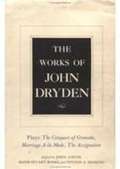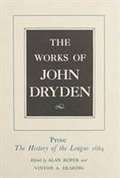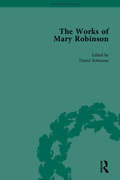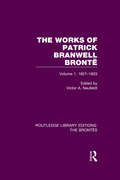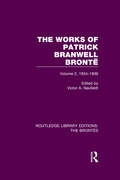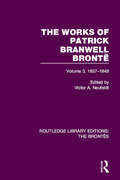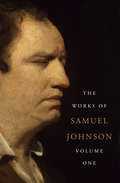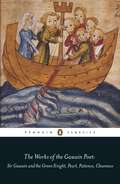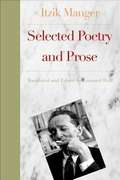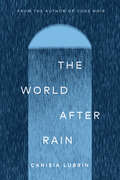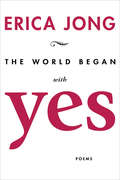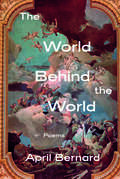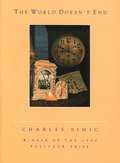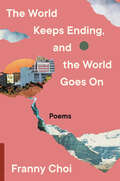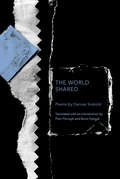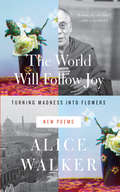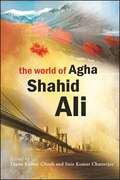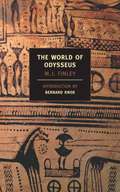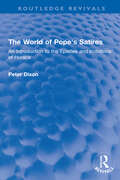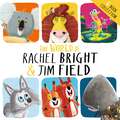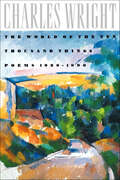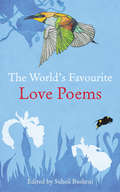- Table View
- List View
The Works of John Dryden: The Conquest of Granada, Marriage a-la-Mode, The Assignation, Volume XI
by John DrydenVolume XI contains three of Dryden's Plays, along with accompanying scholarly apparatus: The Conquest of Granada, Marriage a-la-Mode, and The Assignation.
The Works of John Dryden: The History of the League, Volume XVIII
by John Dryden H. T. SwedenbergThis volume contains Dryden's 1684 translation of Louis Maimbourg's "The History of the League," a work relating to the religious wars of France in the preceding century, and which Dryden used as a commentary on the religious persecutions of his own time in England.
The Works of John Dryden: Wild Gallant, Rival Ladies, The Indian Queen, Volume VIII
by John Dryden John Harrington Smith Dougald MacmillanVolume VIII contains three of Dryden's Plays, along with accompanying scholarly apparatus: Wild Gallant, Rival Ladies, and Indian Queen.
The Works of Mary Robinson, Part I Vol 1
by Daniel Robinson Orianne Smith William D Brewer Sharon M SetzerRegularly the subject of cartoonists and satirical novelists, Mary Robinson achieved public notoriety as the mistress of the young Prince of Wales (George IV). Her association with figures such as William Godwin and Mary Wollstonecraft, and comparisons with Charlotte Smith, make her a serious figure for scholarly research.
The Works of Patrick Branwell Brontë: Volume 1, 1827-1833 (Routledge Library Editions: The Brontës)
by Victor A. NeufeldtThis volume, first published in 1997, contains all of Patrick Branwell Brontë’s known writings, excluding his letters, from 1827 to 1833. This title primarily focuses on the creation of the Glass Town Confederacy and on the emergence of Rouge/Alexander Percy/Ellrington as Branwell’s chief character. All of the texts in this edition are based on Neufeldt’s own transcriptions of the manuscripts, or, where the manuscript is unavailable, on the most reliable accessible text. This edition serves as a record for the growth and development of Branwell’s writing, and it is hoped that it will help to dispel some of the myths and misconceptions that have become associated with Branwell’s name. This book will be of interest to students of English Literature.
The Works of Patrick Branwell Brontë: Volume 2, 1834-1836 (Routledge Library Editions: The Brontës)
by Victor A. NeufeldtThis volume, first published in 1999, contains all of Patrick Branwell Brontë’s known writings, excluding his letters, from 1834 to 1836. This title primarily focuses on the creation of Angria, and on the growing conflict between Alexander Percy, Earl of Northangerland, and Arthur Wellesly, Duke of Zamorna and King Adrian of Angria. All of the texts in this edition are based on Neufeldt’s own transcriptions of the manuscripts, or, where the manuscript is unavailable, on the most reliable accessible text. This edition serves as a record for the growth and development of Branwell’s writing, and it is hoped that it will help to dispel some of the myths and misconceptions that have become associated with Branwell’s name. This book will be of interest to students of English Literature.
The Works of Patrick Branwell Brontë: Volume 3, 1837-1848 (Routledge Library Editions: The Brontës)
by Victor A. NeufeldtThis volume, first published in 1999, contains all of Patrick Branwell Brontë’s known writings, excluding his letters, from 1837 to 1848. This title primarily covers and depicts the end of the Angrian conflict, Branwell’s abandonment of the Angrian saga, and his attempts to establish himself as a published poet and a man of letters. All of the texts in this edition are based on Neufeldt’s own transcriptions of the manuscripts, or, where the manuscript is unavailable, on the most reliable accessible text. This edition serves as a record for the growth and development of Branwell’s writing, and it is hoped that it will help to dispel some of the myths and misconceptions that have become associated with Branwell’s name. This book will be of interest to students of English Literature.
The Works of Rudyard Kipling (One Volume Edition)
by Rudyard KiplingVerse and short stories by Rudyard Kipling.
The Works of Samuel Johnson, Volume One: Life, Poems, And Tales, Volume 1 The Works Of Samuel Johnson, Ll. D. , In Nine Volumes (The Works of Samuel Johnson #1)
by Samuel JohnsonA brief essay on the life and genius of the prolific eighteenth-century English author, followed by a selection of his poetry, letters, and a novella.Under the pen name &“Dr. Johnson,&” English writer Samuel Johnson was a biographer, essayist, lexicographer, literary critic, moralist, playwright, poet, and travel writer. The son of a bookseller, he made so many contributions to the English language that he is regarded as one of the greatest figures of eighteenth-century literature. The first of nine volumes, The Works of Samuel JohnsonVolume One includes an essay on the life and genius of Samuel Johnson, followed by a collection of his poetry, including his &“Drury Lane Prologue,&” &“On the Death of Mr. Robert Levet,&” and &“The Vanity of Human Wishes.&” A selection of his personal correspondence is featured as well, along with his great satirical novella, The History of Rasselas, Prince of Abissinia.
The Works of the Gawain Poet: Sir Gawain and the Green Knight, Pearl, Cleanness, Patience
by Ad Putter Myra StokesA new volume of the works of the Gawain poet, destined to become the definitive edition for students and scholars.This volume brings together four works of the unknown fourteenth-century poet famous for the Arthurian romance Sir Gawain and the Green Knight, in their original Middle English. In one of the great tales of medieval literature, Gawain, the noblest knight of King Arthur's court, must keep a deadly bargain with a monstrous knight and resist the advances of his host's beautiful wife. The dream vision of Pearl depicts a bereaved father whose lost child leads him to glimpse heaven. And in moral poems based on stories from the Bible, Cleanness warns against sins of the flesh and of desecration, while Patience encourages readers to endure suffering as God's will.Little is known about the so-called 'Gawain poet', who wrote during the late fourteenth century. It is believed that he came from south-east Cheshire, an important cultural and economic centre at the time, and he was clearly well-read in Latin, French and English. Although he is not named as the author of Sir Gawain and the Green Knight, Pearl, Patience, Cleanness, the four works have been attributed to him based on a careful comparison of their language, date and themes.Myra Stokes was formerly Senior Lecturer in the Department of English at Bristol University. Her books include Justice and Mercy in Piers Plowman and The Language of Jane Austen.Ad Putter teaches at the English Department and the Centre for Medieval Studies of the University of Bristol, where is Professor of Medieval English Literature. His monographs include Sir Gawain and the Green Knight and French Arthurian Romance and An Introduction to the Gawain Poet, and he is also co-editor of The Cambridge Companion to the Arthurian Legend.
The World According to Itzik: Selected Poetry and Prose
by Leonard Wolf Itzik MangerIn the years between 1929 and 1939, when Itzik Manger wrote most of the poetry and fiction that made him famous, his name among Yiddish readers was a household word. Called the Shelley of Yiddish, he was characterized as being "drunk with talent." This book - the first full-length anthology of Manger's work - displays the range of his genius in poetry, fiction, and criticism. The book begins with an extensive historical, biographical, and literary-critical introduction to Manger's work. The selections include excerpts from his novel The Book of Paradise, three short stories, autobiographical essays, critical essays and foremost, Manger's magnificent poetry - ballads, lyrics, and his bold retellings of the Midrash and Songs of the Megillah. These works, which have the patina of myths acquired ages ago also offer modern psychological insight and irrepressible humor. With Manger we make the leap into the Jewish twentieth century, as he re-creates the past in all its layered expressiveness and interprets it with modernist sensibilities. --BOOK JACKET. Title Summary field provided by Blackwell North America, Inc. All Rights Reserved
The World After Rain: Anne's Poem
by Canisia Lubrin&“How incandescent the language is, each line emitting light through the membrane of time and anticipated grief. The work has a rigorousness, the poet pushing through the ache of experience from the first to the last word.&”—Dionne Brand In her signature epic vision, Canisia Lubrin distills a radiant elegy for her mother along an interwoven and unresolvable axis of astonishment, belonging as much to history as to today. Grief, tender and searing, is the channel through which the poet refracts the realm of contemporary life to reveal the blistering paradox of its private and public entanglements. This is poetry of haunting gravity and resonance, with meditations on love, time, and loss, at once meticulously far-seeing, interior, and inexpressible.woman from fine-print time, disclose to the world: the forecast of our noontime births outdoors; how I distrustevery form of authority, chiefly my own astonishment this poisoned wish is why I love, I bow to deserts,these claychildren of forests everywhere I love the rain, this is no secret, I love the solar wind; hold their elliptical life in the wasteland of our third mouths where flowers are invisible and bones are sanded and amusing,and every heliopause cloud senses our head, how we astonish our memories vining where no shade is enough,since many who&’ll feed me will refuse me their names, and good, who knows what bargains I would makewith their meanings, more bundles of thyme . . . tournaments of family recipes with you at my question,
The World Began with Yes: Poems
by Erica JongThe author of Fear of Flying &“touches on her mother&’s death, astrophysics and her own return to poetry, which &‘came / unbidden / as it / always / does&’&” (The New York Times). Life challenges us to celebrate even when our very existence is threatened. Never have we needed poetry more. Poetry was #1 New York Times–bestselling novelist Erica Jong&’s first love, and she never left it. In a dark time, she celebrates life—the title of this collection, The World Began with Yes, comes from the celebrated Brazilian writer Clarice Lispector, who was deeply in love with life despite many tragedies. Jong believes that the poet sees the world in a grain of sand and eternity in a wild flower—as Blake wrote. Her work has always stressed the importance of the lives of women, women&’s creativity, and self-confidence, and this collection is an inspiration to readers, as well as the next generation of poets. &“Say &‘yes,&’ to this collection and let the world begin.&” —Kim Dower, author of Sunbathing on Tyrone Power&’s Grave
The World Behind the World: Poems
by April BernardAn acclaimed poet finds moral and spiritual connection in this fierce, dexterous volume. Balancing emotional openness with formal restraint, April Bernard proves once again a poet who “harmonizes the raucous and the classic, the songful and the wry, the courtly and the quick” (Wayne Koestenbaum). Throughout her sixth collection, Bernard searches for “the world behind the world,” a spiritual realm of justice and peace, music and grace. The host of saints present in this parallel world includes poets—John Ashbery, Thomas Wyatt, Gerard Manley Hopkins—as well as folklore spirits, animals wild and domestic, and personal ghosts. Mystical, daring, expertly crafted, and ironic, The World Behind the World embarks on a wide-ranging journey through memory and loss to reach “that other world, where nothing human can wreck us.” Along the way, the poet conjures lush woodlands and icy oceans, wry conversations with voices from the past, and transformative moments of reckoning and healing. Rising up from despair, anger, and grief, this powerful collection proposes a moving, personal faith.
The World Doesn't End
by Charles SimicIn this collection, winner of the 1990 Pulitzer Prize, Charles Simic puns, pulls pranks. He can be jazzy and streetwise. Or cloak himself in antiquity. Simic has new eyes, and in these wonderful poems and poems-in-prose he lets the reader see through them.
The World Is Awake: A Celebration of Everyday Blessings
by Linsey DavisInspire children to be thankful for all of God&’s blessings with this joyful celebration of the simple pleasures all around us. Perfect for sharing at bedtime or story time, The World Is Awake gives children (and their parents) a sense of awe and wonder at the world around them.Linsey Davis, New York Times bestselling author and Emmy Award-winning ABC News anchor, invites us to celebrate the everyday miracles that surround us in this inspiring and diverse picture book. From blooming flowers in the backyard to the roaring animals at the zoo to the breeze in the evening trees … the world is awake!Now also available as a board book, The World Is Awake:features playful and heartwarming read-aloud rhymes from Emmy Award-winning ABC News anchor Linsey Davisincludes whimsical, joy-filled illustrations from bestselling artist Lucy Flemingis a great board book for ages 0-4, preschool, kindergarten and early elementary age kidscelebrates diversity and inspires gratitude for God&’s blessingsmakes a wonderful gift for birthdays, Easter, and other gift-giving holidaysCelebrate your everyday blessings through The World Is Awake.Look for additional inspirational children&’s picture books and audio products from award-winning author Linsey Davis:Smallest Spot of a DotHow High is HeavenStay This Way ForeverOne Big HeartThe Linsey Davis Children&’s Audio Collection
The World Keeps Ending, and the World Goes On
by Franny ChoiNamed A Most Anticipated Book by: LitHub * Vulture * Time * A PW 2022 Holiday Gift Pick From acclaimed poet Franny Choi comes a poetry collection for the ends of worlds—past, present, and future. Choi’s third book features poems about historical and impending apocalypses, alongside musings on our responsibilities to each other and visions for our collective survival.Many have called our time dystopian. But The World Keeps Ending, and the World Goes On reminds us that apocalypse has already come in myriad ways for marginalized peoples.With lyric and tonal dexterity, these poems spin backwards and forwards in time--from Korean comfort women during World War II, to the precipice of climate crisis, to children wandering a museum in the future. These poems explore narrative distances and queer linearity, investigating on microscopic scales before soaring towards the universal. As she wrestles with the daily griefs and distances of this apocalyptic world, Choi also imagines what togetherness--between Black and Asian and other marginalized communities, between living organisms, between children of calamity and conquest--could look like. Bringing together Choi's signature speculative imagination with even greater musicality than her previous work, The World Keeps Ending, and the World Goes On ultimately charts new paths toward hope in the aftermaths, and visions for our collective survival.
The World Shared (Lannan Translations Selection Series)
by Dariusz SosnickiDariusz Sosnicki's poems open our eyes to the sublime just beneath the surface of the mundane: a train carrying children away from their parents for summer vacation turns into a ravenous monster; a meal at a Chinese restaurant inspires a surreal journey through the zodiac; a malfunctioning printer is a reminder of the ghosts that haunt us no matter where we find ourselves.Among the perpetrators and victims,buzzed or wasted to the bone,gliding without their blinkers onin the ruts of the national fate—they're not at home.Dariusz Sosnicki is an award-winning poet, essayist, and editor in Poland.
The World Will Follow Joy: Turning Madness into Flowers (New Poems)
by Alice WalkerA poetry collection of &“playful and crooning lyricism&” from the National Book Award– and Pulitzer Prize–winning author of The Color Purple (Booklist). In this dazzling new collection, Alice Walker offers over sixty new poems to incite and nurture contemporary activists. Hailed as a &“lavishly gifted writer,&” Walker imbues her poetry with evocative images, fresh language, anger, forgiveness, and profound wisdom (The New York Times). Casting her eye toward history, politics, and nature, as well as to world figures such as Jimmy Carter, Gloria Steinem, and the Dalai Lama, she &“distills struggles, crises, and tragedies down to bright, singing lessons in living with awareness and joy&” (Booklist). By attentively chronicling the conditions of human life today, Walker shows, as ever, her deep compassion, profound spirituality, and necessary political commitments. The poems in The World Will Follow Joy remind us of our human capacity to come together and take action, even in our troubled political times. &“Her spirituality, concern for human rights, and almost old-fashioned, determined joyousness run deep and her devoted readers will want to follow her as she turns &‘madness into flowers&’&” (Library Journal).
The World of Agha Shahid Ali
by Tapan Kumar Ghosh; Sisir Kumar ChatterjeeFeaturing essays by American, Indian, and British scholars, this collection offers critical appraisals and personal reflections on the life and work of the transnational poet Agha Shahid Ali (1949–2001). Though sometimes identified as an "Indian writer in English," Shahid came to designate himself as a Kashmiri-American writer in exile in the United States, where he lived for the latter half of his life, publishing seven volumes of poetry and teaching at colleges and universities across the country. Locating Shahid in a diasporic space of exile, the volume traces the poet's transnationalist attempts to bridge East and West and his movement toward a true internationalism. In addition to offering close formal analyses of most of Shahid's poems and poetry collections, the contributors also situate him in relation to both Western and subcontinental poetic forms, particularly the ghazal. Many also offer personal anecdotes that convey the milieu in which the poet lived and wrote, as well as his personal preoccupations. The book concludes with the poet's 1997 interview with Suvir Kaul, which appears in print here for the first time.
The World of Odysseus
by Bernard Knox M. I. FinleyThe World of Odysseus is a concise and penetrating account of the society that gave birth to the Iliad and the Odyssey--a book that provides a vivid picture of the Greek Dark Ages, its men and women, works and days, morals and values. Long celebrated as a pathbreaking achievement in the social history of the ancient world, M. I. Finley's brilliant study remains, as classicist Bernard Knox notes in his introduction to this new edition, "as indispensable to the professional as it is accessible to the general reader"--a fundamental companion for students of Homer and Homeric Greece.
The World of Pope's Satires: An Introduction to the Epistles and Imitations of Horace (Routledge Revivals)
by Peter DixonFirst published in 1968, The World of Pope’s Satires is a stimulating and challenging book showing how the satires written by Pope during the 1730s were not only expressions of his own .poetic personality but were also responsive to the habits and attitudes of the age. The author considers Pope’s uses of some current conversational technique (especially that of ‘raillery’) and of the closely related social ideal of the cultivated gentleman. Pope’s regard for certain personal attributes and moral values – notably hospitality, integrity, friendship, charity and self-knowledge – is examined in two ways; as it expresses itself positively in the satires, and as it is defined negatively by his antipathy towards courtly self-seeking and hypocrisy, contemporary manifestations of acquisitiveness, and the pride associated with neo-stoicism. The final chapter is wide ranging and shows that although Pope is at times representative, and therefore limited, in his response to the pressures and uncertainties of the age, his satires live because of the subtlety of his treatment of such Augustan commonplaces as Order and Balance and the passion and spirit of his writing. This will be an interesting read for students of English literature.
The World of Rachel Bright and Jim Field: The Lion Inside and Other Stories: 6 book collection
by Rachel BrightA collection of six stories from the world of Rachel Bright & Jim Field. Meet a brave lion, two squabbling squirrels, a wandering whale and many more incredible animal characters in these best-loved rhyming tales.Featuring: The Lion InsideThe Koala Who CouldThe Squirrels Who SquabbledThe Way Home for WolfThe Whale Who Wanted MoreThe Gecko and the Echo(P) 2022 Hodder & Stoughton Limited
The World of the Ten Thousand Things: Poems 1980–1990
by Charles WrightThe World of Ten Thousand Things gathers The Southern Cross (1981), The Other Side of the River (1984), Zone Journals (1988), and a new group of poems, "Xionia," into one volume, allowing us to see Wright's work of the past decade as, in essence, one long poem, a meditation on self, history, and the metaphysical that is among the most ambitious and resonant creations in contemporary American poetry.
The World's Favorite Love Poems
by Suheil BushruiIn this delightful volume of love poetry, renowned literature professor Suheil Bushrui presents nearly two hundred cherished works from around the world and down through the ages. Here, traditional classics from Shakespeare to Rossetti are thrown into new light beside the poetry of Eastern writers such as Ibn Arabi and Rumi, while little-known poems from the indigenous peoples of Africa, Australasia, and the Americas offer passages that are both moving and profound. Exploring the many facets of love - desire, devotion, delirium, joy, and sorrow - this uniquely diverse collection reminds us of the bonds we all share through the universal experience of love. Without poetry love is wordless. "Stand still and I will read to thee" (Donne).
